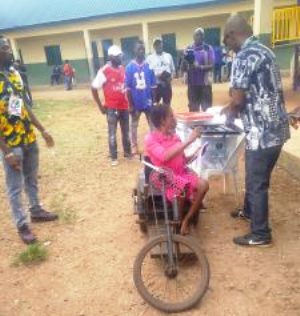Project Enable Africa, working with the National Commission for Persons with Disabilities and the Ministry of Humanitarian Affairs and Poverty Reduction, launched Nigeria’s first State of Disability Inclusion Report for 2024 on Friday.
This is the first full national report that uses data to show how well people with disabilities are included in areas like education, health, jobs, government policies, and social support.
The report points out important problems and chances for the government and society to become more inclusive.
The head of Project Enable Africa, Mr. Olalekan Owonikoko, said the report is a major step in checking how well disability rights are being carried out in Nigeria’s 36 states and the capital.
He explained that the report was created after talking to many people and holding interviews with people with disabilities across the country.
Mr. Ayuba Gufwan, the Executive Secretary of the Commission (represented by Mr. Nkem Uchegbulam), said the new guidelines will make sure accessibility rules are followed and certificates given to those who comply.
He added that strict systems are now in place to make sure the rights of people with disabilities are protected and respected.
He also promised that the commission would send a message to all ministries and state governments to explain how the report’s findings relate to their work.
Dr. Kola Olugbodi, speaking for the Project Enable Africa board, said that when the Disability Act became law in 2019, the government gave five years for full compliance.
He said this report shows how far the country has come in areas like accessibility, jobs, and inclusion for people with disabilities. He added, “This isn’t just a report—it’s a wake-up call.”
Mrs. Maryam Keshinro, the Permanent Secretary of the Ministry of Women Affairs (represented by Mr. Ayuba Richard), said that people with disabilities have been ignored for too long.
She said their voices, stories, and hopes are often overlooked.
According to her, the report can help change this by showing that Nigeria is serious about inclusion and fairness.
She said the ministry, which supports women’s rights and vulnerable groups, believes no one should be left behind.
Keshinro also talked about how women and girls with disabilities face even more challenges, especially in education, healthcare, jobs, and politics.
She asked important questions like: Are public spaces truly accessible? Do schools support children with disabilities? Are development programmes inclusive? Do we truly listen to people with disabilities?
Mr. Bukola Adebayo gave a summary of the report. He said all states should pass and enforce disability laws. As of 2024, only 23 states have passed such laws, and only 15 have working agencies.
He said governments must plan and spend money both on disability-focused needs and making sure all programs are inclusive. He also suggested a nationwide check of public buildings to see if they are accessible.
He said the Commission can start this with help from the new enforcement guidelines.
Adebayo also suggested changing health insurance programs so they can better serve people with disabilities.
He said where such insurance exists, it must be designed to meet the special needs of people with disabilities.
The report is part of the Disability Inclusion Metric Project, funded by the Nigerian Youth Futures Fund. It comes at an important time—right at the end of the five-year transition period set by the National Disability Act passed in 2019.


